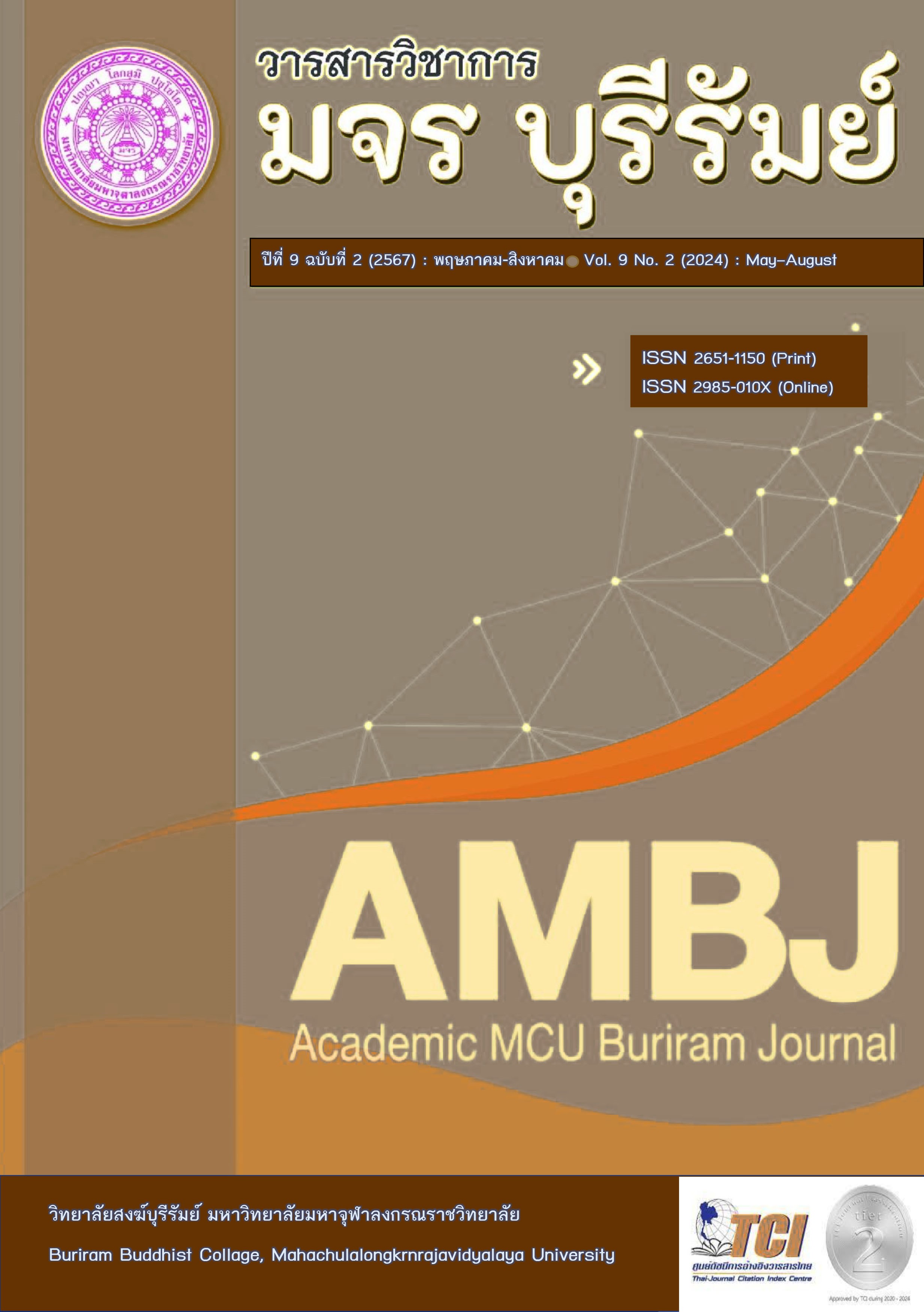Using Inquiry-based Learning Management Combined with Game Boards to Develop Science Process Skills, Specifically Regarding Ecosystems, for Sixth-Grade Elementary School Students
Keywords:
Science Process Skills, Inquiry-Based Learning Management Game BoardsAbstract
The purpose of this research were to develop science process skills using an inquiry-based learning management format combined with a game board to enhance knowledge about the environment for sixth-grade elementary students. The target group consists of sixth-grade students from a government school in Chachoengsao province. The sample group for the research includes 20 students from Grade 6, who were selected using purposive random sampling during the second semester of the academic year 2566. The research took 8 hours using purposive sampling and utilized the following research tools: 1) Inquiry-based learning management plans combined with a game board focusing on environmental topics, totaling 3 plans and 8 hours. 2) A skills assessment test on science process skills related to the environment, consisting of 20 multiple-choice questions. 3) An evaluation of science process skills using Rubrics, assessing 4 skills: observation skills, skills in finding relationships between space and time, skills in interpreting data, and skills in interpreting and summarizing data. The statistical analysis used in data analysis includes the mean () and standard deviation (S.D.).
The research results found that:
This research were to develop science process skills using an inquiry-based learning management format combined with a game board to enhance knowledge about the environment for sixth-grade elementary students, it was found that students had overall good science process ( = 2.38, S.D. = 0.43).
References
กระทรวงศึกษาธิการ. (2560). ตัวชี้วัดและสาระการเรียนรู้แกนกลาง กลุ่มสาระการเรียนรู้วิทยาศาสตร์ (ฉบับปรับปรุง พ.ศ. 2560) ตามหลักสูตรแกนกลางการศึกษาขั้นพื้นฐาน พุทธศักราช 2551. กรุงเทพมหานคร: โรงพิมพ์ชุมนุม สหกรณ์การเกษตรแห่งประเทศไทย จำกัด.
ทิศนา แขมมณี และคณะ. (2553). ศาสตร์การสอน: องค์ความรู้เพื่อการจัดกระบวนการเรียนรู้ที่มีประสิทธิภาพ. พิมพ์ครั้งที่ 13. กรุงเทพมหานคร: จุฬาลงกรณ์มหาวิทยาลัย.
พรรัตน์ กิ่งมะลิ. (2552). การพัฒนาทักษะกระบวนการทางวิทยาศาสตร์ เรื่อง พืชโดยใช้การสอนแบบสืบเสาะหาความรู้สำหรับนักเรียนชั้นประถมศึกษาปีที่ 2. วิทยานิพนธ์ศึกษาศาสตรมหาบัณฑิต สาขาวิชาหลักสูตรและการสอน. บัณฑิตวิทยาลัย: มหาวิทยาลัยราชภัฏเพชรบุรี.
พิมพันธ์ เดชะคุปต์. (2556). การสอนคิดด้วยโครงงานการเรียนการสอนแบบบูรณาการทักษะศตวรรษที่ 21. พิมพ์ครั้งที่ 3. กรุงเทพมหานคร: โรงพิมพ์จุฬาลงกรณ์มหาวิทยาลัย.
ศิรินภา อินอ่วม. (2557). การพัฒนาทักษะกระบวนการทางวิทยาศาสตร์ เรื่อง การถนอมอาหาร ของนักศึกษาระดับประกาศนียบัตรวิชาชีพชั้นสูง ด้วยการจัดการเรียนรู้แบบสืบเสาะหาความรู้ผนวกการทำโครงงานวิทยาศาสตร์. กรุงเทพมหานคร: มหาวิทยาลัยเกษตรศาสตร์.
สถาบันทดสอบทางการศึกษาแห่งชาติ องค์การมหาชน. (2565). ค่าสถิติพื้นฐานคะแนน O-Net ประถมศึกษาปีที่ 6 ปีการศึกษา 2565. เข้าถึงได้จาก https://www.niets.or.th (สืบค้นเมื่อ 10 ตุลาคม 2565).
สถาบันส่งเสริมการสอนวิทยาศาสตร์และเทคโนโลยี. (2551). ตัวอย่างการประเมินผลวิทยาศาสตร์ นานาชาติ: PISA และ TIMSS. กรุงเทพมหานคร: อรุณการพิมพ์.
สถาบันส่งเสริมการสอนวิทยาศาสตร์และเทคโนโลยี. (2561). คู่มือการใช้หลักสูตรรายวิชาเพิ่มเติมวิทยาศาสตร์ วิชาเคมี ระดับมัธยมศึกษาตอนปลาย กลุ่มสาระการเรียนรู้วิทยาศาสตร์ (ฉบับปรับปรุง พ.ศ. 2560) ตามหลักสูตรแกนกลางการศึกษาขั้นพื้นฐาน พุทธศักราช 2551. กรุงเทพมหานคร: สำนักพิมพ์จุฬาลงกรณ์มหาวิทยาลัย.
Downloads
Published
How to Cite
Issue
Section
License
Copyright (c) 2024 Academic MCU Buriram Journal

This work is licensed under a Creative Commons Attribution-NonCommercial-NoDerivatives 4.0 International License.
ทัศนะและความคิดเห็นที่ปรากฏในบทความวารสารฉบับนี้ถือเป็นความรับผิดชอบของผู้เขียนบทความนั้น ไม่ถือเป็นทัศนะและความรับผิดชอบของบรรณาธิการ





